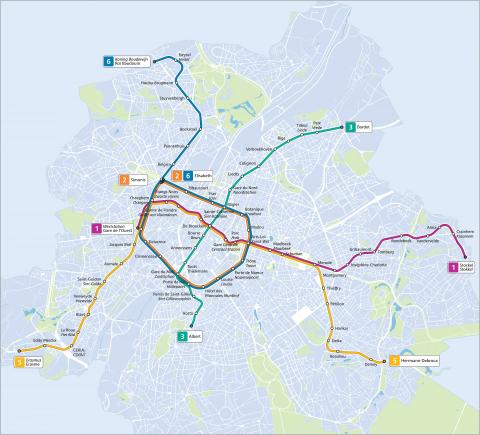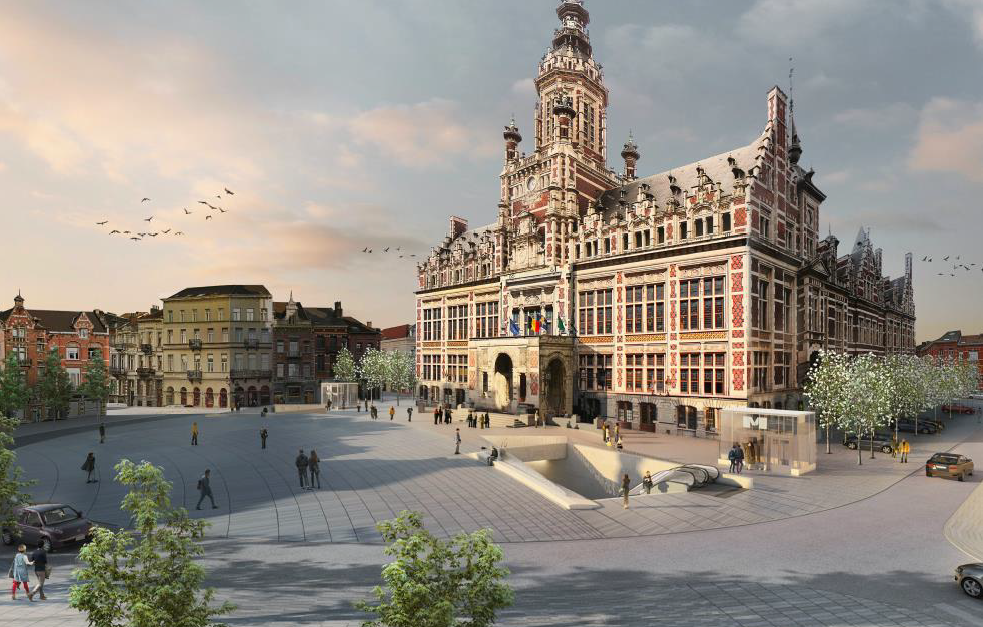A planning permit for a new metro line – called 'Metro 3' – in Brussels has now officially been submitted, bringing the Capital Region another step closer to improving the connection between the north and the south of the city.
While the works in the first renovation phase (between the Albert stop in Saint-Gilles and the North Station) are in full swing, the amended planning and environmental permit applications are being submitted for the second construction phase: a 5-km tunnel and the construction of seven metro stations between the North Station to the Bordet station in Evere, as well as a depot in Haren.
"If we look at the network map, we can clearly see that a crucial connection is missing in the north of Brussels," said Brieuc de Meeûs, CEO of STIB. "It is very important that we have a strongly expanded underground rail network at that location."

Metro 3 (green) will connect the north and the south of Brussels. Credit: Beliris
After two years of studying the possible impact of the Metro 3 project on various parameters – mobility, soil, air, water, climate, landscape and heritage, waste, health, acoustics and economic aspects – the metro line was found to be "the best solution to meet the future mobility needs in Brussels."
Beliris (the organisation that oversees transport infrastructure in the Brussels-Capital Region) and STIB acknowledge that the construction site will have "a significant" impact on the public space, but assert that it "must be balanced out with the undeniable advantages of this extra metro line," said Federal Minister Karine Lalieux, responsible for Beliris, at a press conference on Wednesday.
Related News
- Brussels is one step closer to a new metro line
- Brussels Northern district: Plans for a harmonised and human renewal
- Annual STIB pass price lowered to just €12 for all 18- to 24-year-olds
To create this new line, a 5-km long tunnel will be dug from Bordet – underneath the existing train station – at a depth of 20 to 30 meters. The tunnel will connect seven new metro stations from Bordet in the municipality of Evere to the North Station in Schaerbeek, before continuing along already-existing stops.
Especially for the construction of the (very deep) stations, there is still a lot to consider, as they have to be built from above ground. Additionally, they should also be well-integrated into the urban fabric, with entrances for large passenger flows and lifts.
Seven new stations
The terminus of the new line will be at Bordet, which will be connected to the S-line of the SNCB trains, the tram and the bus as well as possible. In the future, the tram to Brussels Airport Zaventem will also be added.
The next station, Paix, will be located at the Place de la Paix, where the music academy of Evere is located. It will be followed by Tilleul in the Rue Frans Verdonck.
The next station will be Riga in Schaerbeek, located behind the Helmet church, followed by the Verboekhoven stop, whose construction will likely have the greatest impact on the neighbourhood as it is partly built in an inner block.
The sixth new station to be built is Colignon, which will be constructed in front of the town hall of Schaerbeek, completely redesigning the historic square that it will be built on.
The last new station to be built is that of Liedts, where the underground technical installation of the Sibelga electricity network operator has already been moved to make room for the new metro station.
Aiming for 2030?
As it easily takes two years to build a metro station, about three years to dig the new metro tunnel, and an 18-month testing period before the metro can actually operate, it will take quite a few more years before the new line will be running.
On top of that, the applied-for building permit has yet to be reviewed and delivered, and the public tenders must still be launched, which is why Cédric Bossut of Beliris is aiming to complete the project by 2030-2031.
The financing aspect of the project is significant as well: the cost for the part of the line between the North Station and Bordet is estimated at €1.5 billion. The transformation of the pre-metro from the North Station to the Albert stop is expected to cost another €600 million, and new metro trains must also be purchased (about €200 million).
In total, that comes down to at least €2.3 billion.
"We know that this project requires significant financial resources. The quality objectives required for the development and management of public spaces must be maintained," said Schaerbeek mayor Cécile Jodogne. "We are therefore counting on a substantial investment to bring this project to a successful conclusion. The Metro 3 project will only benefit the city of tomorrow if everyone's commitments are kept."
More information about the entire project and the separate metro stations on Metro 3 can be found on the project's official website, in French and in Dutch.

